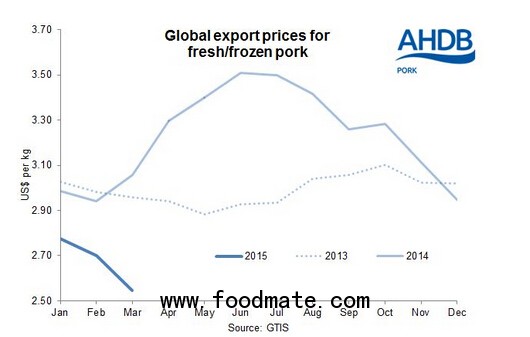By the end of the year, it had subsided to a more normal $2.95 per kg. Since then, export prices have continued to fall sharply and by March, the average was as low as $2.55 per kg.
This is the lowest level recorded since December 2009, is 17 per cent lower than a year earlier and as much as 27 per cent down on last summer’s peak.
Pressure on prices continued in April, with unit prices falling for the US, Canada and Brazil; EU figures for April are not yet available.

Since last summer, prices have declined across all of the world’s major exporters.
Although EU export prices did not reach the same heights as those from the Americas, the weakening euro has ensured its prices have still fallen in dollar terms. The average EU export price dropped from around $3.30 per kg in mid-2014 to $2.49 in March 2015 but in euro terms, this represented a fall of only around 10 cents per kg.
Similar currency depreciation has helped Brazilian and Canadian pork to remain competitive while limiting domestic price falls.
This competitiveness has meant that US export prices have had to fall too, although they have done so more slowly and remain higher than in the other major exporters.
Similar currency depreciation has helped Brazilian and Canadian pork to remain competitive while limiting domestic price falls.
This competitiveness has meant that US export prices have had to fall too, although they have done so more slowly and remain higher than in the other major exporters.







